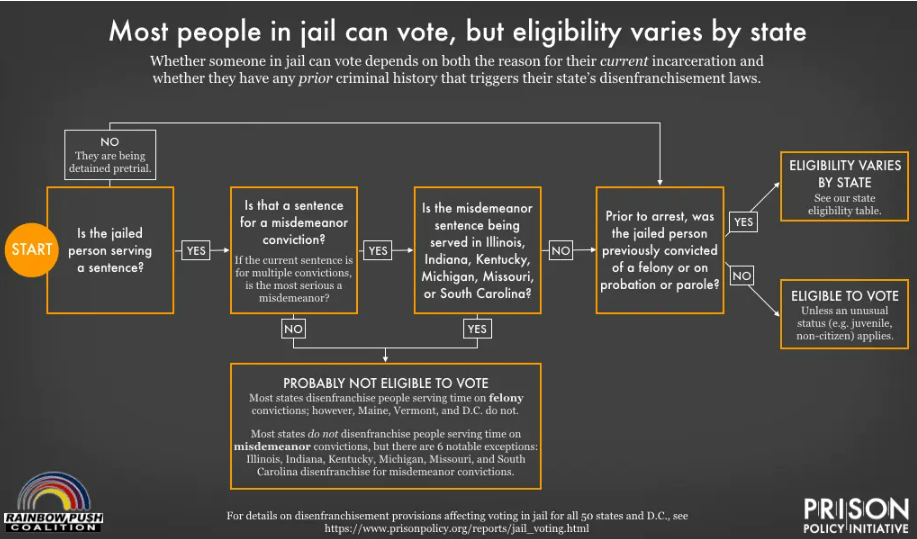Voter Disenfranchisement of Eligible Jailed Voters
Approximately 746,000 persons are in jail in a given day, and most have the right to vote.

Each election cycle, thousands of eligible voters are effectively disenfranchised because they sit in a jail cell, and voting/criminal justice reform advocates call this "de-facto disenfranchisement," and impacts almost 600,000 in American jails who haven't been convicted of a crime.
Americans detained before trials are allowed to vote, a status affirmed by the 1974 US Supreme Court case O'Brien v. Skinner. As a matter of law, pretrial detainees are presumed innocent and retain the voting rights they had before being charged with a crime. Yet people in jail face significant, sometimes insurmountable obstacles to registering to vote and accessing a ballot.
Many are in jail simply because they can’t afford bail. “That is creating a system where if you are rich enough, you can access your right to vote, because you’ll be able to get out of pretrial detention,” said Sylvia Albert of Common Cause. “And if you aren’t rich enough, then you can’t access your right to vote.”
The issue doesn’t only affect those held while awaiting trial. Nationally, about 146,000 people are serving sentences for misdemeanors in jails on any given day, and depending on state laws, many of them retain their voting rights even while incarcerated because they've been convicted of a misdemeanor and not a felony crime.
The burden falls particularly heavily on Black and Latino Americans, who make up a combined 30% of the U.S. population but account for 52% of the country’s jail population. Those disparities stem from well-documented racial bias in the criminal justice system, from policing to prosecution to sentencing.
The biggest barrier is that incarcerated people often don’t realize they’re allowed to vote. Many think their criminal charge disqualifies them, and they have other concerns in jail beyond figuring out how to cast a ballot. Only in recent years have advocates gotten cooperation from city and state governments to provide voter education and improve voter accessibility for eligible jailed voters.
In Cook County, Illinois, the county jail has served as a polling place since 2020. Spurred by a 2019 law, the sheriff and clerk’s office established several polling places around the sprawling jail complex in Chicago. The polling places were up and running for the 2020 primaries, when the facility was touted by local officials as the nation’s first jail-based precinct. County officials have continued to operate the polling places in recent years. In the 2022 primary, voters at the Cook County Jail could cast a ballot in one of the five polling places at the complex. County officials have continued to operate the polling places in recent years. In the 2022 primary, voters at the Cook County Jail could cast a ballot in one of the five polling places at the complex.
Voters at the jail turned out in higher numbers than voters in Chicago as a whole in that primary. Block Club Chicago reported that roughly half of the 1,384 jail voters made use of Illinois’ same-day registration.
You can read the report "Eligible, but Excluded; A Guide to Removing the Barriers to Jail Voting" from Prison Policy Initiative.










